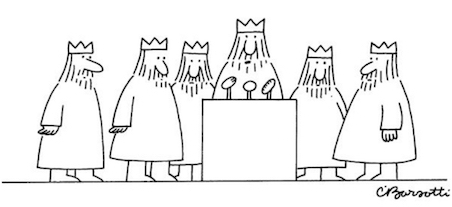
Long ago I ended up in a sort of leadership position for a member-owned, volunteer-run, consensus-based, youth-heavy multi-house housing cooperative. It has everything great and bad about democracy. Over five years I made tons of mistakes and lots of friends and lots of not friends and learned a lot about myself and how to get things done. At some point I wrote some of them down.
- Don’t bring a proposal to a membership meeting unless you know it’s going to pass. That means doing the legwork and building support behind the scenes, and also having a feel for the temperature in the room.
- You can’t keep all the balls in the air. Be intentional and maybe even public about which balls you are letting drop. Focus on existential threats. Accept that your org is and will always be a leaky boat.
- Hardest biggest lesson: I am full of self-doubt by nature and profession (scientist). But I learned to stick to the course of action I thought was right, against the noise of people thinking I was wrong, without having to convince myself they were wrong and I the brave harried hero.
- When you propose a rule, don’t write it to fix the thing that went wrong, write it to prevent anything like it from ever happening again. The difference is how much thought you put into how it happened and what has to fail for it to happen again.
- You have to be able to deal with people not liking you without getting resentful yourself. It was hard. I never would have learned except I had to. And even then I failed a lot.
- People respond to you genuinely publicly suffering to meet their needs. I was vulnerable a lot and begging a bunch.
- Need to bring people together? Being the common enemy works in a pinch. This is the corollary to letting balls drop. You can use this to get everyone to take on the job of keeping those less important but still nice and now unifying balls in the air.
- You can’t ever assume things are fine and not currently about to blow up.
- Can’t communicate enough with the membership. It’s amazing how fast bad vibes can start to build up in secret if you aren’t constantly rehumanizing yourself.
- Neat trick for the horse trading that is a part of getting things done: One nice right of your authority position is the power to create symbols of value out of thin air (titles, the name of a thing, the signature on an important contract). They cost you nothing to create and others value them. So create them and trade them away in exchange for things that matter. I signed four houses to my coop, and had a pet name for each one, and never got to name a single one. I always had to trade the name off in exchange for support on closing the deal.
- Power exists and you should use it to do what you think is right for the org, even if you might be wrong, as long as you are always double checking and striving to be less wrong. Democracy is inherently political/nonideal, in the sense that it is the sum of a bunch of people doing more and less undemocratic things within the broader constraints of a democratic accountability framework. So acts of power and working behind the scenes and managing information strategically aren’t undemocratic, they are a part of it, and you should do them when you need to, and you shouldn’t do them too much or its your head. That’s the way of things: admitting the existence of power and the necessity of occasionally wielding it despite your ideals. Running a system by occasionally violating its tenets isn’t bad, it’s beautiful. In an internally inconsistent world, what else but an internally inconsistent organization can survive?
Things I never figured out:
- How to guess who will be reliable before investing a bunch and being wrong.
- How to inspire. The few times it happened were totally unreproducible flukes. So I did a lot on my own.
- How to build an org that learns from its mistakes
- How to build a culture with really widespread engagement, not just a good core group


